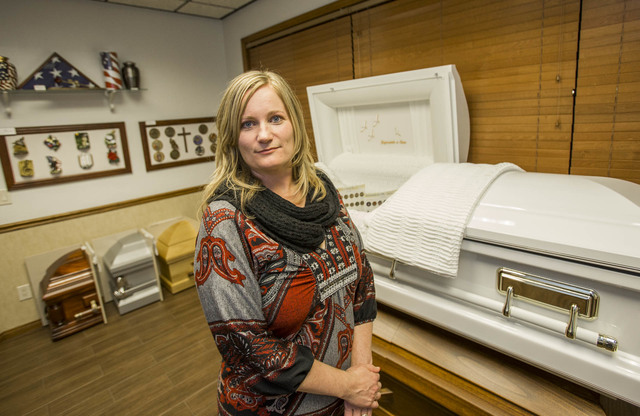Trauma Intervention Program CEO also serves as on-scene death investigator
At work, southwest resident Jill Roberts is surrounded by death.
Roberts works part time with the Clark County coroner’s office as an on-scene death investigator and also serves as the CEO of Trauma Intervention Program of Southern Nevada, an organization that sends its volunteers to emergency scenes where they provide support.
Roberts said she likes to think she is working for the deceased person, whether she’s on the ground investigating a death or training her 70 volunteers on how to be compassionate and understanding toward families undergoing trauma .
“They don’t have a voice anymore, so we can be that voice for them whether it’s in the capacity of TIP and being able to support their loved ones when they are not there to do it themselves or if it’s in the capacity of the coroner’s office, trying to process what happened to that person,” Roberts said.
Before her two jobs, Roberts had a hospitality and hotel-management career.
In 2008, Roberts read a news story about TIP and was interested in getting involved. Three years later, she was asked to take over as CEO.
“It was very scary … but I weighed the pros and cons and thought, ‘What better way to live than to do my volunteer work and get paid for it every day?’” she said.
One of her most memorable moments as a TIP volunteer happened on Father’s Day years ago. Roberts responded to three emergency calls that day — all of which involved a father who had just died.
That day, Roberts met a little girl who was holding a card and gift for her grandfather that she would never get to show him.
“That day made me so grateful for my dad,” she said. “After spending time with these families who had just lost Dad or Grandpa, I was able to give my dad a big hug and tell him how much I love him.”
Although Roberts does not respond to emergency calls with her volunteers, she said spreading education about the grieving process is just as important as being on the ground.
Roberts said a common misconception is the assumption that all people grieve the same way. She also urges emergency responders to let people involved cry as loud as they want instead of silencing them.
Volunteer Dick Hofacker has been with TIP for 20 of its 23 years in Southern Nevada. He said the organization has always had great leadership, but he has noticed an improvement under Roberts via the number of volunteers and resources she and her staff brought in.
“She’s (increased) the quality of the people,” Hofacker said. “She makes everybody feel like we are doing a great job. I can’t say that we’ve had anybody better than her.”
Roberts decided to make another leap in 2013, this time as a part-time death investigator. Roberts said she had always been interested in the medical field and had pursued a biology degree in college.
At the coroner’s office, Roberts investigates the identity and cause of death of the decedent. She is also responsible for informing deceased people’s next of kin.
“When I walk to the doorstep, I always think, ‘I’m about to change this person’s life forever,’ but if I can make it any easier then that makes it worth it for me,” Roberts said.
Coroner’s assistant Paul Parker said Roberts’ skills from TIP translate well into her role in the coroner’s office.
“We write the last chapter of someone’s life, and Jill is one of the best authors that we have,” Parker said.
Roberts admits that some of the situations she witnesses give her nightmares. Despite that, Roberts said, she tries to put her experiences at work in perspective and tells herself that her bad days are nothing in comparison to what the families she serves are going through. Roberts said she also practices self-care by baking, practicing yoga and spending time with her family to make sure that she doesn’t burn out and experience “compassion-fatigue.”
Parker said Roberts’ upbeat and positive personality makes her stand out at the coroner’s office.
“When there are tough cases, Jill is one of the people that our investigators go to to talk about how they’re feeling, how they are doing and how to best provide services to those families,” Parker said. “You would never know from talking to her just how much she has seen.”
Visit tipoflasvegas.org.






















